This post may contain affiliate links. For more information, read my disclosure policy.
Knoepfle is the Swiss version of Spaetzle, an drop noodle made of an egg noodle dough. It’s our family tradition and they are the best holiday side dish recipe.
It’s kind of a labor of love but it’s worth every second!
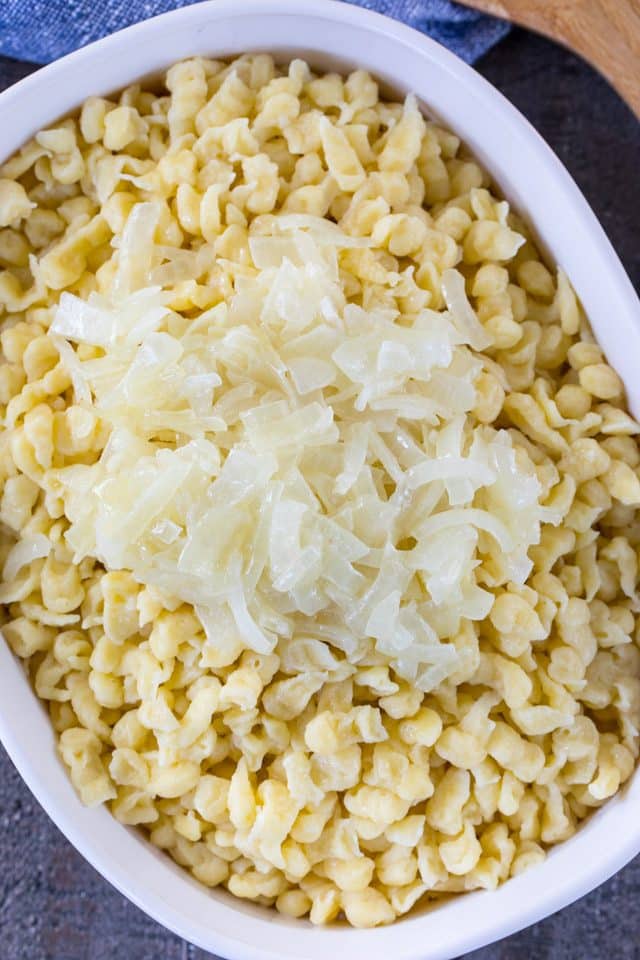
I know, it’s a weird word: Knoepfle. Until 2011 I thought it was spelled k’niflea and then I googled and was astonished. You pronounce it the way I thought it was spelled: k – ni – flea. I’ve been eating these Swiss egg noodles my entire life and I just had to share the recipe with you.
Knoepfle is a type of egg noodle. Have you ever heard of Spaetzle? Spaetzle is the more popular form of this noodle. Spaetzle is a German egg noodle, but is (supposed to be) longer and thinner, somewhat like spaghetti. Knoepfle is the “button-shaped” equivalent to spaetzle. I equate it with Switzerland, because my dad is Swiss and we always explained it by calling knoepfle a “swiss noodle.” I think that Knoepfle originated in Germany and, from my research, I learned in Switzerland it is spelled Chnoepfli.
For me, knoepfle means two things: holidays and daddy.
Knoepfle is a special occasion food. It’s one of those things that is not entirely simple to make and it’s time consuming. We would eat it on Thanksgiving and Christmas, and maybe one other time of year when the stretch between Christmas and the next Thanksgiving got to be too long. My dad’s whole family makes it. I remember my Nana and Uncle preparing it when I was a child. But, really, I equate it with my dad, because no one makes it like him.
As a child celebrating Thanksgiving, I never new people ate mashed potatoes with their meal. We would have stuffing and knoepfle. It wasn’t until I was older that I realized mashed potatoes are a Thanksgiving staple. During the first year we were married I wasn’t even going to make potatoes until it dawned on me that my husbands’ family was attending our meal and would probably miss one of their traditions.
There are only 3 ingredients in the noodle recipe:
- Eggs
- Flour
- Milk
However, even with only three ingredients, it was time consuming to make. The mixing was done by hand, with a wooden spoon, and the dough was thick. You have to beat it until it’s a bit glassy looking and there are no lumps left, which would take several minutes. The time and arm strength made it a holiday-only dish…until my dad got himself a KitchenAid mixer. Now we eat knoepfle all year long!
Are you wondering how you get the little drop rounded shape of the noodle? When my dad was young the would do it by hand with two spatulas or a spatula and a knife and rake them into the boiling water one by one. You can see that huge bowl up there – the smallest amount we ever make – and can imagine how long that took!
When my nana visited Switzerland in the 1950s, she brought back the best invention ever: a knoepfle machine.
Basically, it’s a flat sheet of metal with holes and a cup that you can put the dough in to run it over the holes.
That’s one of the original in the family (my dad, my uncle, my aunt, and my grandparents all had one). As people have passed away, they’ve handed down the machines so now some of the grandkids have them.
Don’t worry – you don’t have to go to Switzerland to get your own knoepfle machine: amazon has them. (Of course it does.)
Get your own Knoepfle (Spaetzle) machine here.
There are a few ways to serve your knoepfle:
- Plain (or with parmesan cheese) – which is the only way I eat it. (I’m picky.)
- With fried onions – that’s the way we traditionally serve it. While my dad makes the dough, my mom fries the onions and they’re mixed with the noodles as they come out of the pot.
- With onions and Swiss cheese – my grandparents used to mix them with onions, then coat them with Swiss cheese and bake it like a casserole until melty.
- With lots of gravy!
Regardless of how you serve them you have to use a lot of butter. A LOT!
I’ll always remember my mom melted an entire stick of butter in a pan while frying onions (2 large yellow ones). And if you’re making them plain, you have to add butter to the dish to stir them with or they’ll stick to each other.
Knoepfle is synonymous with lots and lots of butter. (Bonus if you use Challenge Butter – that’s literally the ONLY butter my family has used. EVER.)
Those are my parents. 🙂
If you’re going to make these knoepfle, know that they seem hard but they’re really not. Here are a few tips:
- The rule of thumb is equal parts eggs and flour, then milk to get to the right consistency.
- When adding milk and beating, pay attention in the video how thick the dough is. You don’t want it so thick it won’t go through the machine, but not so thin it runs through like spaghetti.
- For a small family dinner we’ll make the recipe as written: 4 eggs to 4 cups flour. More often, he does up to 6 or 8 eggs!
- Use a large pot, preferably with a strainer insert. It makes it easier.
- Remember to add butter to the cooked noodles and stir after each addition so they don’t stick.
- If you have leftover, they freeze well!
If you try these, be sure to take a photo and tag me on social using #crazyforcrust. I want to see!
I hope they become a family tradition, just like they are for us.
Want even more? Subscribe to Crazy for Crust to get new recipes and a newsletter delivered to your inbox. And stay in touch on Facebook, Pinterest, Twitter, and Instagram for all my latest updates.
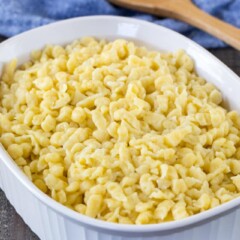
Knoepfle (Spaetzle)
Ingredients
- 4 large eggs
- 4 cups all purpose flour
- 2 cups whole milk approximately
- 1 teaspoon salt
- 8 tablespoons butter
- 2 medium onions
Instructions
- Beat eggs and about 1 cup milk in an electric mixer fitted with the paddle attachment. Add 2 cups flour and mix for a minute, then add the remaining flour. The batter will be very thick. Add about 1 cup more milk and beat until glassy and thick. It's the right consistency when it takes 4-5 seconds to drip off a wooden spoon. If it's too thin, add some additional flour. If it's too thick to drip, add more milk.
- While you're mixing up the dough (or after, it's okay if the dough sits), chop your onions to small dice. Melt butter in a frying pan and cook the onions until translucent, but don't caramelize them. Set aside. (If you don't want to serve with onions, skip this step, but you'll still need the butter.)
- Meanwhile, begin boiling your water. It is best to use a large stock pot that has a nested colander. Once water is boiling, add approximately a cup of batter to the spaetzle press and slowly slide the press back and forth to create your knoepfle. Watch for the knoepfle to float to the top of the water, stir to get any that are stuck on the bottom to float, then boil for an additional one minute (after they are all floating). Strain and place into a large bowl. Bring water back up to a boil between batches.
- Once adding a batch to your serving bowl, add either some of the onions or 2 tablespoons of butter. Stir so they don't stick together.
- Serve with the sauted onions, extra butter, gravy, and Swiss or parmesan cheese.
- These freeze well if you have leftovers.
Recipe Video
Recipe Notes
Recipe Nutrition
**Did you make this recipe? Don’t forget to give it a star rating below!**
Other holiday recipes you’ll love:
Last Updated on May 20, 2022
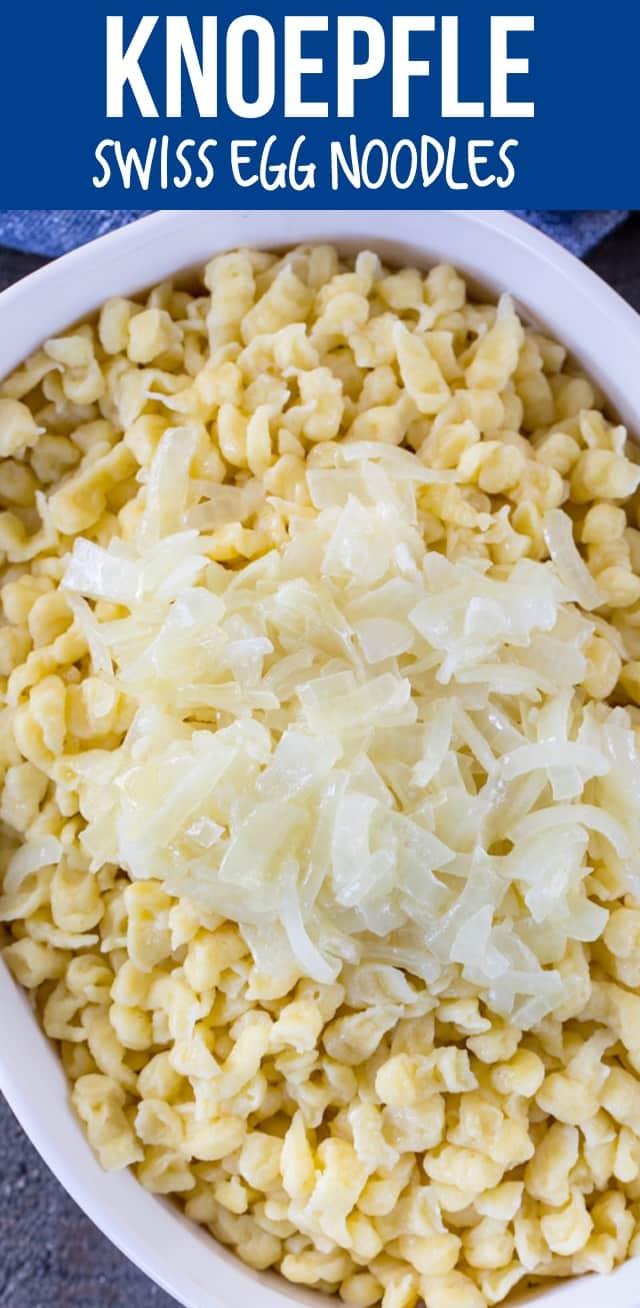
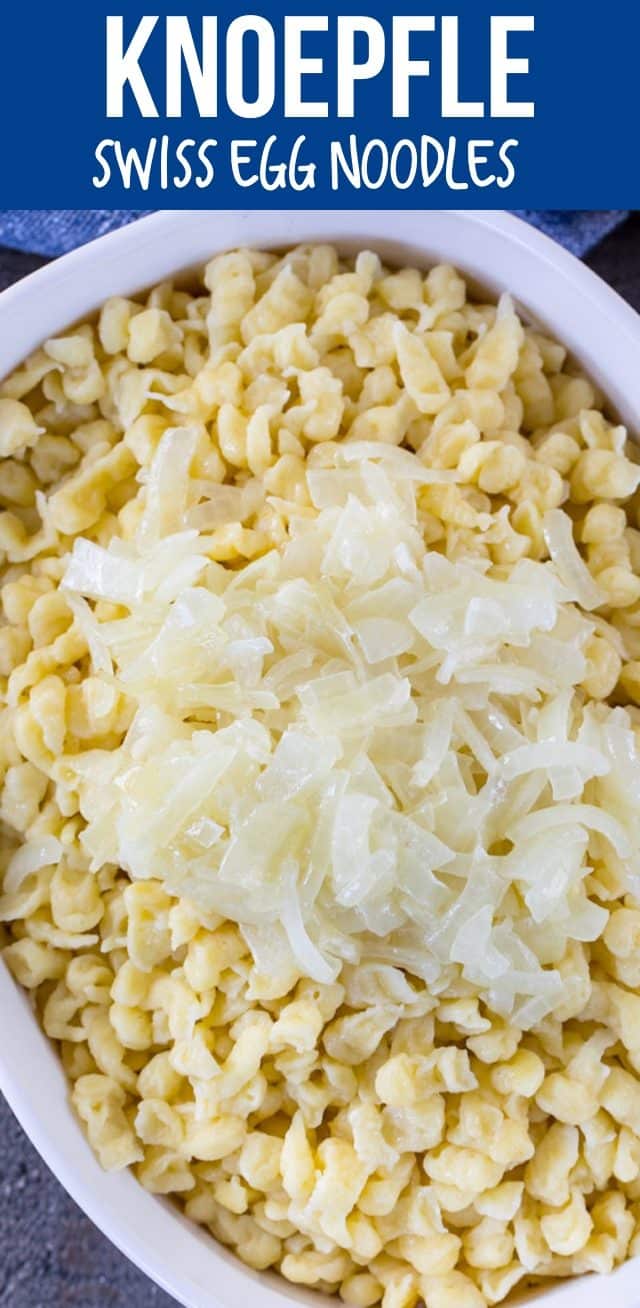
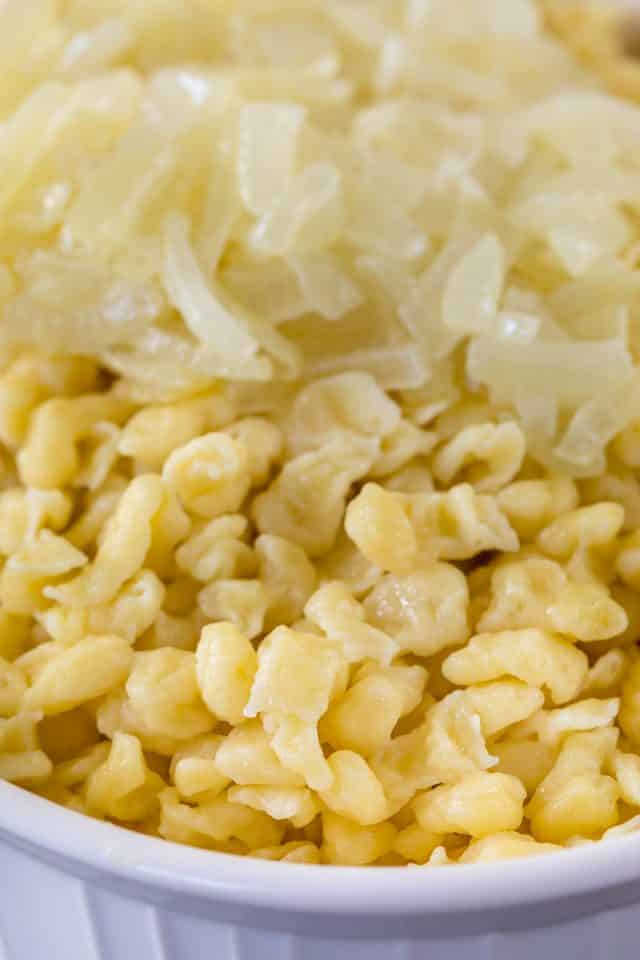
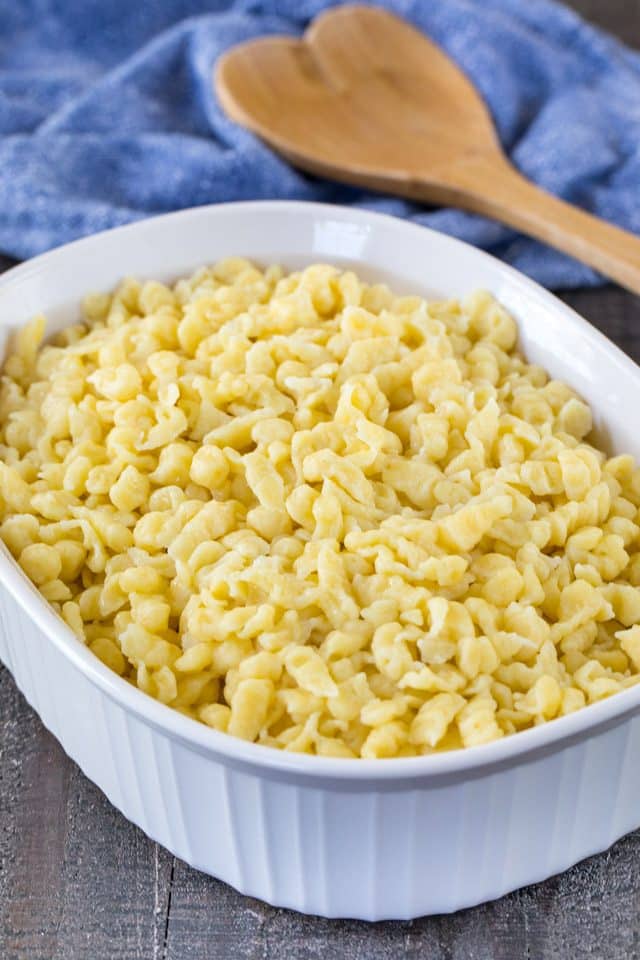
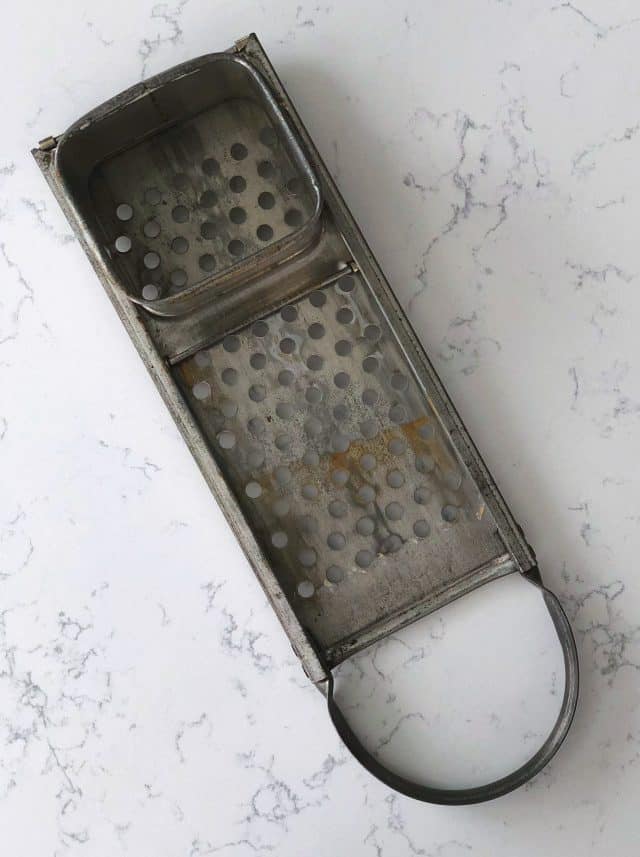
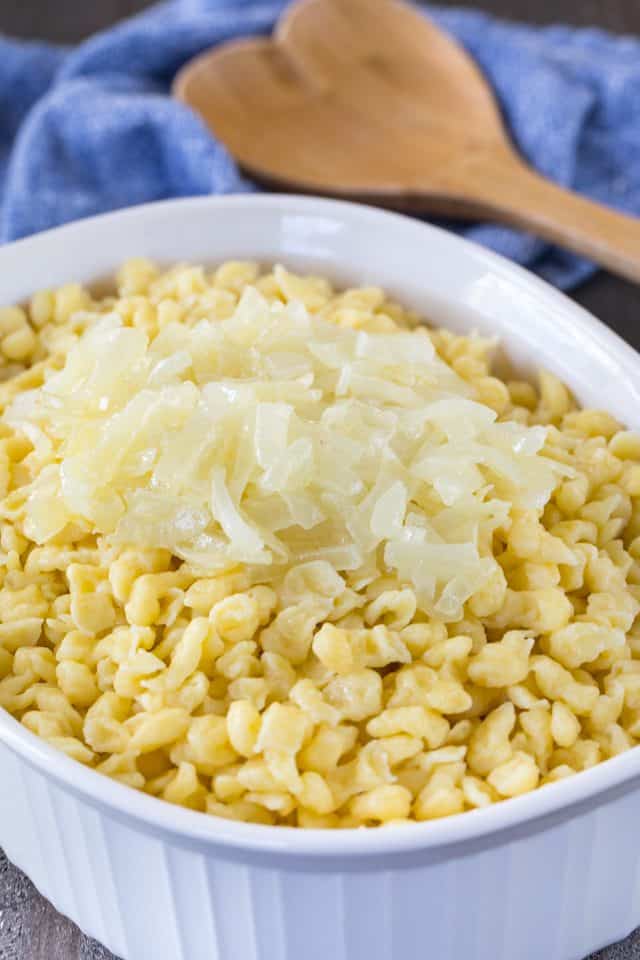

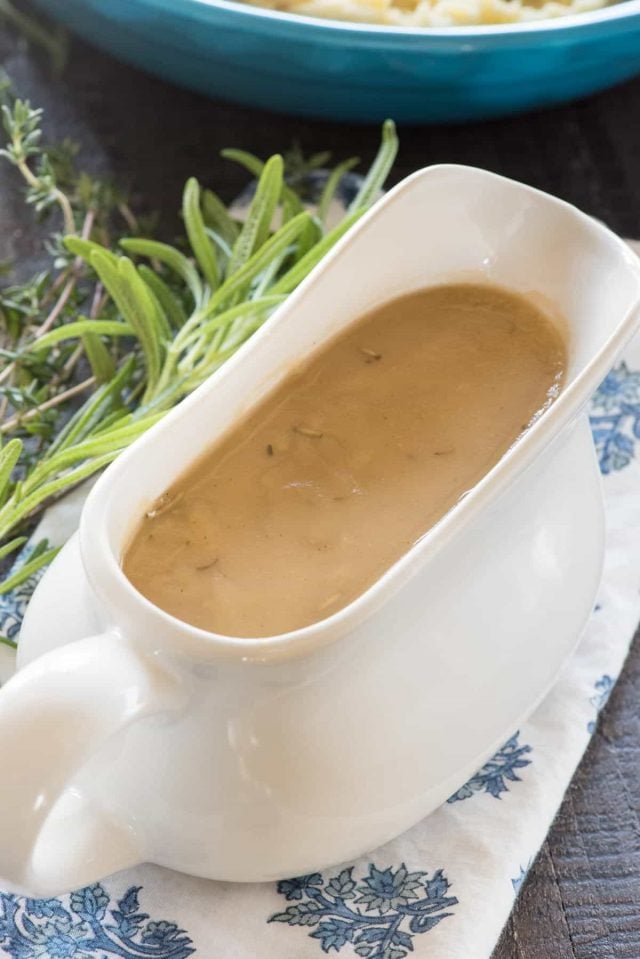
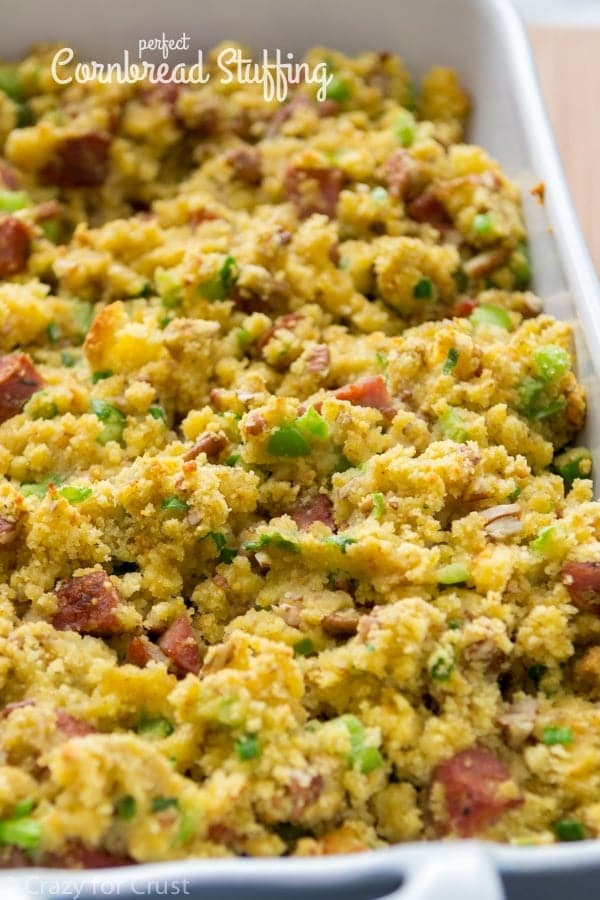
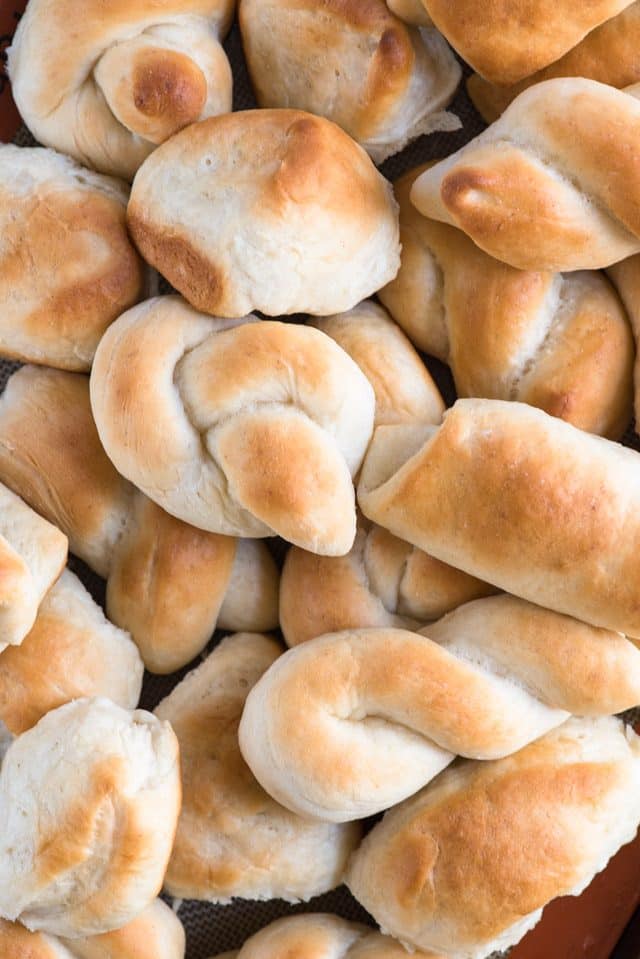
Thank you for the wonderful recipe! We are Swiss and I grew up eating these! Do you have any recommendations on how to keep them warm? My daughter is participating in an International Feast at her school and we are going to bring these. Thank you!
Usually we store them in a casserole dish with a lid and then microwave them before serving if they’ve cooled down. You could probably put them in a warm slow cooker and just keep them on warm – add a little extra butter when you’re making them between batches so they don’t stick together too much.
I grew up with knoepfles and have always loved them. We use the same proportions of flour and egg but add a bit of salt and milk or water to consistency. We always use a big spoon to scoop the dough and a small one to cut off the dough into the boiling water. Its interesting that this is Swiss, but apparently very popular with southern Germans! There may be an ancestry clue here somewhere!
Love that!!
My mother was German but made these – fried steak, then quickly sauté the onions in the steak pan with butter and a little milk, then pour it over them. We called them Kneffles (spelling?), and dropped small spoonfuls into the boiling water so they were much larger.
Still, one of the best memories of my mom’s cooking!
I grew up with this at grandmas house – very German – and we didnt uaw a machine. We would roll into long ropes and then cut off with a pair of scissors. Made a unique shape. And then fry breadcrumbs in butter to top.
As it was taught to me by my Swiss born mother-in-law; the recipes for spaetzli and knopfli (the “li” at the end is a “swissification” of the german name) are almost identical, the difference is the consistency (viscosity) of the batter.
Spatzli is a bit runnier, so that it drops down perfectly through the spatzli grate, but is too runny to handle.
Knopfli (meaning buttons) dough is a tad thicker; making it more amenable to the scissors method, employed by those poor souls who have no access to a spaetzli grate.
Love this recipe. My husbands grandmother use to make this every Thanksgiving and Christmas. His grandfather made a knoepfle grate, which makes the buttons a little bigger. I grate over the boiling water and scope them out with a slitted spoon. The grate is about 10” in diameter and has a handle to hold onto and legs that hook over the pot. I wanted to post a picture but couldn’t.
Featured In
Rate This Recipe